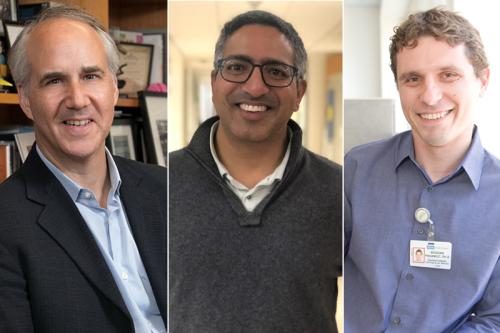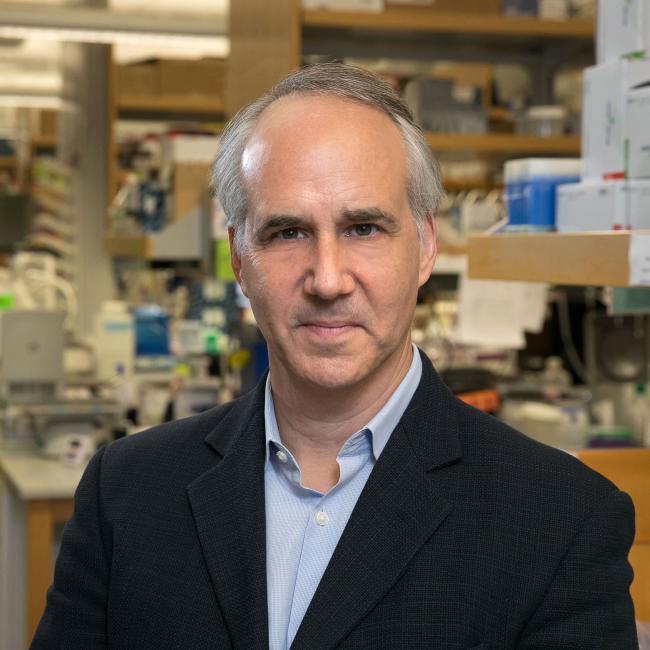
From U Magazine: Is the fault in our genes?
Among the most confounding features of COVID-19 is the seeming randomness of its impact on infected individuals. Millions of people around the world have been infected with SARS-CoV-2, the virus that causes COVID-19, and many have shown no sign of illness. But those who have gotten sick have experienced a dizzying array of symptoms that include fever, cough, loss of smell or taste, difficulty breathing, digestive issues, organ damage and stroke.
“We have limited ability to predict how sick someone will get,” says Daniel H. Geschwind, MD (RES ’95, FEL ’97), PhD, MacDonald Distinguished Professor in Human Genetics at the David Geffen School of Medicine at UCLA and member of the Eli and Edythe Broad Center of Regenerative Medicine and Stem Cell Research at UCLA.
While the elderly and people with some pre-existing conditions including heart and lung disease are more likely to get sick, there are new cases every day of people who belong to none of these groups and end up with severe symptoms. “The vast majority of young people can be exposed to the virus and seemingly develop no symptoms, and yet there is a handful of healthy 22-year-olds ending up in intensive care units on ventilators,” says Dr. Geschwind, who also directs the Institute for Precision Health at UCLA. “Likewise, we know age is a major factor, but we see some older people who get infected and do quite well.”
What, then, determines who gets sick and who doesn’t? Dr. Geschwind and colleagues Manish Butte, MD, PhD, and Bogdan Pasaniuc, PhD, believe that at least part of the answer to this mystery is in our genes. Together, they have undertaken a sweeping effort to collect and analyze whole-genome sequencing data from thousands of COVID-19 patients in search of genetic risk factors associated with susceptibility to and severity of COVID-19. They have partnered with the five other UC Health system campuses to gather and sequence the genomes of patients representing the broad spectrum of COVID-19 cases: those who didn’t seem to get sick at all, those who got sick but didn’t end up in intensive care, those who got extremely sick and recovered and those who died.
Their goal is to leverage computational and statistical techniques to analyze and compare genetic features from a large number of COVID-19 patients with diverse backgrounds.
By scanning the entire genome for mutations that could explain the disease, they aim to pinpoint both the common and rare genetic factors that are associated with susceptibility to and protection from the virus, as well as those factors that are linked with the infection’s most devastating symptoms. “There are two ways of looking at the genomes of COVID-19 patients,” says Dr. Pasaniuc, associate professor of pathology and laboratory medicine, human genetics and computational medicine. “We can look at the genome of one individual and ask, ‘Can we learn something about why this one young, healthy person got so sick?’ Or, we can look at the whole picture of data collected from people around the world and look for one commonality — say a single gene disruption — that is shared among all the people who are getting extremely sick.”
The findings from this investigation could give scientists and clinicians the tools to identify individuals as being at high or low risk of infection, develop new treatment and prevention strategies and, one day, plan an individual’s treatment based on their genetic predispositions.
To increase the impact of their efforts, the group is integrating their data into two global consortia: the COVID Human Genetic Effort and the COVID-19 Host Genetics Initiative, which bring together whole genome sequencing data from more than 150 COVID-19 studies worldwide. “The amazing thing that is happening right now is that everyone is sharing their data as openly and as quickly as they can,” says Dr. Butte, holder of the E. Richard Stiehm Endowed Chair in Pediatric Allergy, Immunology and Rheumatology and chief of the Division of Allergy, Immunology and Rheumatology. “What we are doing is not just going to help the hundreds-of-thousands of patients who are part of the UCLA Health system; it will affect the whole world.”
Understanding the importance of a project like this requires transcending the way we traditionally think about getting sick. “There’s this longstanding belief that if you’re lying in bed coughing with a fever, it’s because a bacteria or virus has made its way into your lungs and is causing infection,” says Dr. Butte, who also is a member of the UCLA Broad Stem Cell Research Center. “But being exposed to a pathogen is only part of the picture. What we’ve seen again and again — from malaria to tuberculosis to Ebola to COVID-19 — is that only some people who are exposed to these pathogens get sick.”
This has long been attributed to bad luck, Dr. Butte says. But modern technologies are allowing us to understand that it’s often not just the virus or bacteria that makes a person get sick; it’s how that virus or bacteria is interacting with the body of the person it’s infecting, also known as the host. “A variety of studies have shown that a lot of insight into how to fight disease or infections can be gleaned from looking at the genetics of the host,” Dr. Butte says. “What genetic program in a given person’s immune system went awry and allowed the infection to get a toehold, then a foothold and then to conquer?”
This concept becomes even more important in the context of SARS-CoV-2. It is not the virus itself that has caused hundreds of thousands of deaths; it is the body’s response to it. “Some viruses, like Ebola and measles, are very cytopathic or cytolytic, meaning they destroy the host’s tissues,” Dr. Butte says. “SARS-CoV-2 is only mildly cytolytic. When people die of COVID-19, they mostly die because their immune system became hyperactivated.”
This hyperactive immune response can damage the lungs, heart and kidneys and lead to clotting disorders and even stroke. So, a critical part of this research is not just to understand who is susceptible to becoming sick, but also to identify what genetic mechanisms in some people’s immune systems are provoking this deadly immune response. “With this information, we could look at a patient’s genetic data and then warn their physician that they need to watch out for a hyperactive immune response and maybe administer a treatment to prevent this from happening,” Dr. Geschwind says.
Genome-wide association studies have proven to be powerful tools to link genetic markers with disease. One major drawback, however, is that these studies historically have focused on individuals of European ancestry, according to an analysis published in the journal Cell. This disparity is an injustice, one that makes collecting diverse and representative patient data on COVID-19 cases all the more imperative. August 2020 data from the U.S. Centers for Disease Control and Prevention indicate that American Indian or Alaska Native, Black or African American, and Hispanic or Latino people in the United States have been nearly three times as likely to become infected with SARS-CoV-2 and between four and five times as likely to be hospitalized due to COVID-19 as those with European ancestry.
Almost certainly, this effect is due to centuries of social and economic inequities that today, for example, reduce access to health care and force unavoidable exposure in work environments that are less safe than staying at home. “Indeed, there are no genes related to eye, hair and skin color that influence disease outcomes of COVID-19,” Dr. Butte says.
To better understand if the genetic variants they find in patients with COVID-19 are clinically meaningful, the researchers need to compare those variants to hundreds of thousands of genomes obtained from healthy individuals. Such databases of genomes are mostly drawn from populations of European ancestry. Owing to the diversity of Los Angeles, approximately 40 percent of the patient population of UCLA Health is of non-European ancestry, and the UCLA researchers are optimistic that their data will make these global repositories more diverse — and, therefore, more helpful to the communities hardest hit by this pandemic.
"By studying the genomes of a diverse set of individuals, not only can we disentangle the interplay between genetic and social determinants of health, but we also can make sure that all individuals regardless of their ancestry are served by current and future genomic findings,” Dr. Pasaniuc says.
Another impediment to realizing the full potential of genetic medicine for COVID-19 and beyond is that the privacy of genetic data is an issue about which many people are concerned. For this study, the group is using de-identified patient samples, meaning that identifiers such as a patient’s name or family history are not included as part of the data.
As a proponent of and leader in precision medicine, Dr. Geschwind feels that the benefits of using genetic data in research and medicine far outweigh the perceived risks.
“People are concerned about privacy, and they should be,” he says. “We keep these data very secure within our health system, and we have very strict protocols for sharing that are designed to protect privacy. At the same time, people share so much of themselves online in a way that it is freely available. Somehow, genetic data are viewed differently than many other data related to health. I think this genetic exceptionalism really hinders the application of genetic tools that could greatly improve health care.”
But perhaps the benefits of this project will demonstrate the value of people sharing their genetic data and create a greater willingness to do so. “Once we identify genetic factors that help predict optimal treatments and outcomes for patients with COVID-19, this will provide a very concrete, real-world example of why we need to have genetic information on all of our patients before they're sick,” Dr. Geschwind says.
His collaborators share this sentiment. Despite their diverse backgrounds — Dr. Geschwind is a developmental neurobiologist, Dr. Pasaniuc is a computer scientist and Dr. Butte is an immunologist — they say they were brought together to work on this project by the allure of genetics as a potential key to help unlock the disease. “We each came to realize that you have to dive into the genetics to understand why our patients are getting sick,” Dr. Butte says. “This genetic study of patients with COVID is such a great opportunity for us. We’re finding new ways to take better care of patients and grapple with a challenging medical mystery.”

